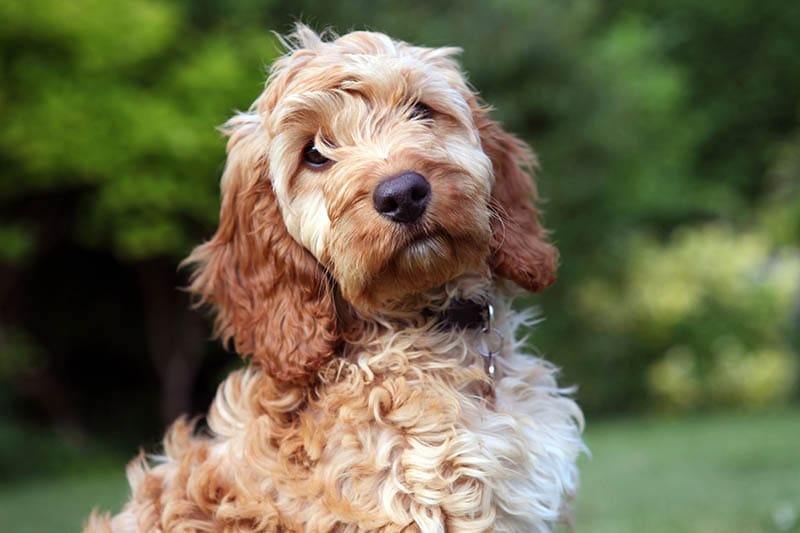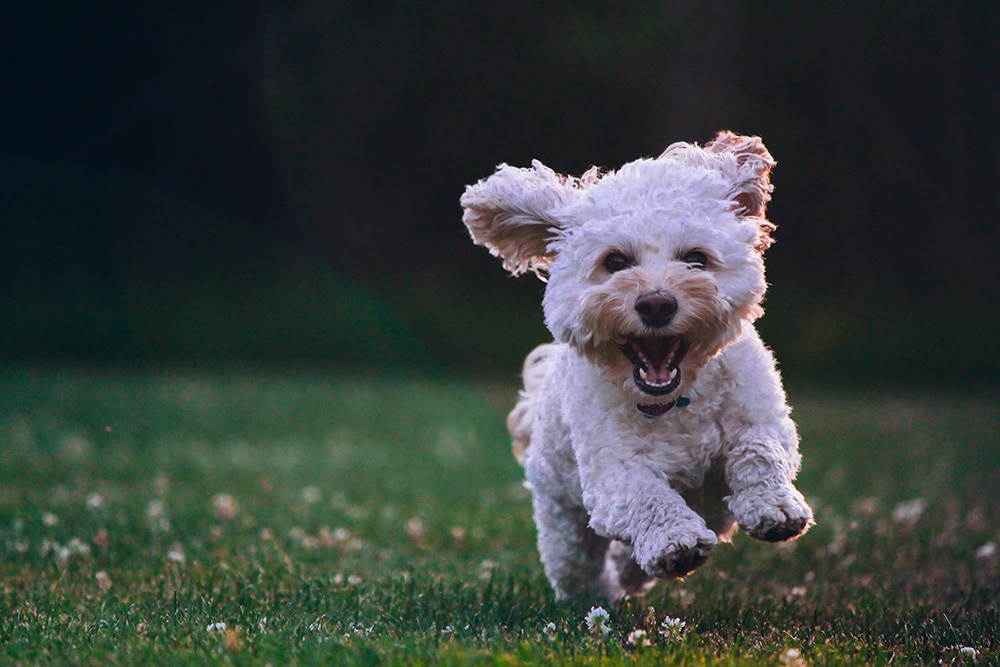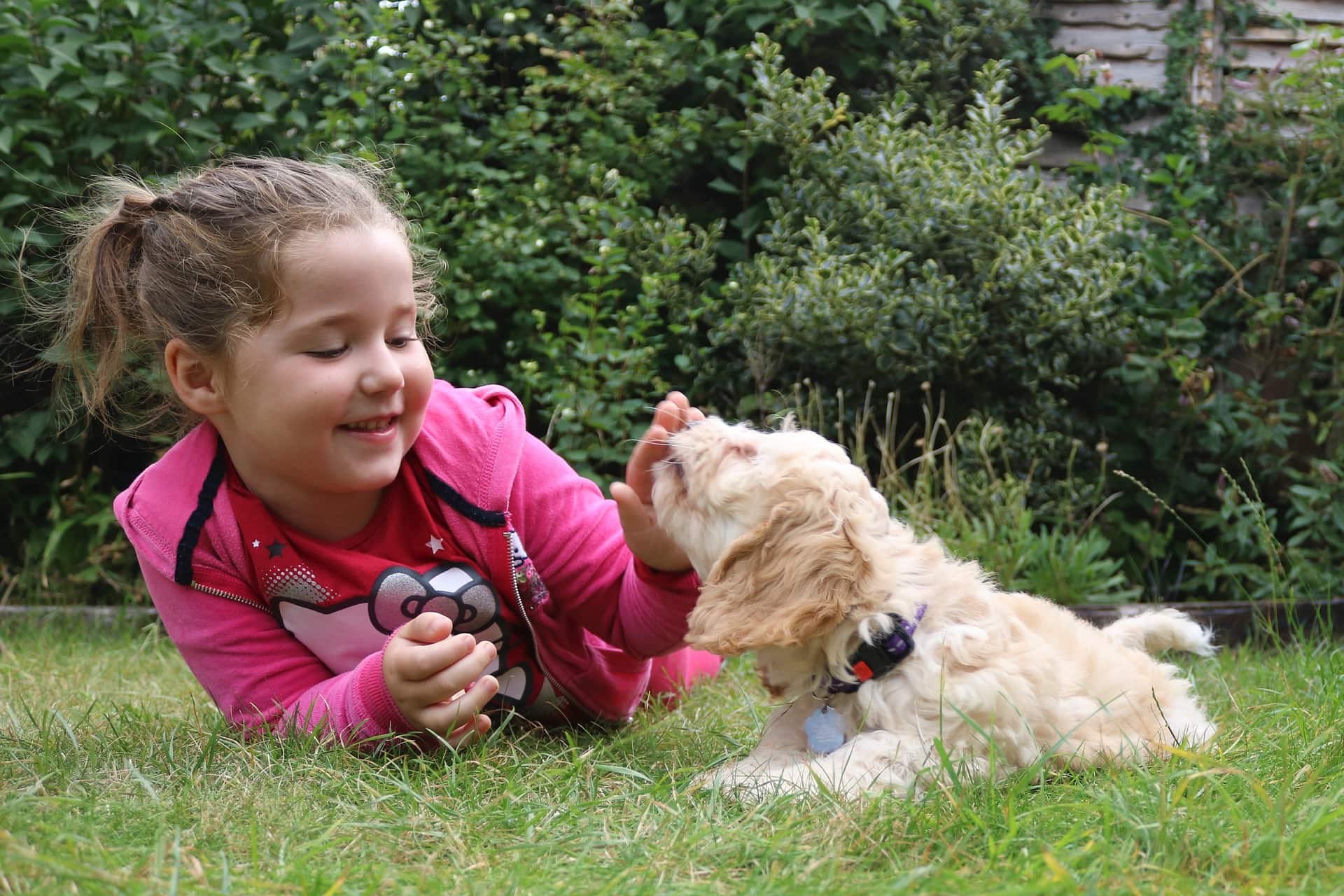Click Below to Skip Ahead
Mini Cockapoos are the most popular of the Cockapoo mixes, and with one look, you’ll have no trouble seeing why. The scaled-down pup dials up the teddy bear-like cuteness, with its loving eyes and button nose popping out against a sea of wavy fluff. As with any Poodle mix, there’s much more than meets the eye with this adorable designer dog.
Breed Overview
Height:
11–14 inches
Weight:
13–18 pounds
Lifespan:
12 – 15 years
Colors:
White, cream, red, chocolate, golden, black, apricot
Suitable for:
Active families, those needing a low-shedding dog
Temperament:
Loyal & loving, friendly, carefree, easy-to-train
Mini Cockapoos are Cocker Spaniel and Miniature Poodle mixes, and they date back to the earliest days of designer hybrids in the 1960s. They are the most common kind of Cockapoo, falling between a Standard Poodle mix (or Maxi Cockapoo) and a Toy Cockapoo.
The breed combines the calm, sweet demeanor, affinity for children, and adoring nature of a Cocker Spaniel with the Poodle’s intelligence, hypoallergenic coat, and playfulness. No matter where you live or who shares the home, the loyal, lovable, and low-maintenance Cockapoo can be a perfect fit for nearly anyone!
Mini Cockapoo Breed Puppies

Mini Cockapoos are often more energetic as puppies but are no less adaptable to people and routines. Puppies carry their Poodle parent’s keen intellect and trainability, making them ready to learn manners and commands. As crossbreeds, they can come in various colors and coats, from the Poodle’s curls to the loose wavy or straight Cocker Spaniel hair.
Cockapoos are rare to find in a shelter. Specialty poodle-mix or small dog rescues around the country take in Cockapoos from kill shelters or breeders. They’re an excellent initial spot to look for a new pet, allowing you to help an intelligent, trainable dog in need and save substantial money.
The downside to adopting is the uncertainty behind the Cockapoo’s genetic history, though that doesn’t mean breeders don’t have their share of problems. Because of the crossbreed’s popularity and variety in looks, irresponsible breeders have room and reason to market uncertain mixes as genuine Cockapoos. The best breeders will readily offer information on pedigree, health, and genetic testing.
Temperament & Intelligence of the Mini Cockapoo
Mini Cockapoos have an infectious temperament, bringing a happy-go-lucky attitude and often clownish behavior to the household. The Cocker Spaniel influence adds a gentle affability to accompany the Poodle’s similarly loving attitude and quick intellect. They are highly sociable with people and animals, usually preferring company over being alone. A Mini Cockapoo makes an excellent therapy dog.
Separation anxiety isn’t uncommon. The people-pleasing and loyal temperament means Mini Cockapoos also crave attention. They may be prone to loneliness and stress without their owner.
Cocker Spaniels are among the most likely breeds to experience separation anxiety. Poodles are particularly prone to barking or whining while away from their owner and can become destructive, which are traits they may pass on to their Cockapoo kin.
Fortunately, Poodles also pass on their smarts. Many experts believe their intelligence to be superior to nearly all dog breeds. Cockapoos are extra-bright and easy to train, and their Cocker Spaniel relatives are no dullards either. Like the Poodle, the Cocker Spaniel became a favorite companion after working as a hunting dog. It’s an intelligent breed with less need for constant mental stimulation.
Are These Dogs Good for Families?
Cockapoos are open and loving to all members of the family and even strangers. They pair well with children and stay cheery through the random rough pat or awkward bump. The excitability may be a worry, as an overzealous pup may knock over a small child during playtime.
A family is often preferable for a dog like a Cockapoo. Many have seemingly endless amounts of energy and are always willing to play. They’re a talented and trainable breed with a knack for tricks and tomfoolery. Children and Mini Cockapoos can amuse one another for a long time when you need a break. At the same time, they’re emotionally intelligent, making excellent cuddle buddies on the couch when you need them.
Mini Cockapoos aren’t generally destructive or aggressive around the house unless they get angsty from being alone for too long. But with training, socialization, routines, and a more even temperament that comes with age, they can be content in many potentially adverse situations. With their hypoallergenic coat and low tendency towards slobbering, they’re also great for people who want to keep cleanups and allergens to a minimum.

Does This Breed Get Along With Other Pets?
Mini Cockapoos don’t discriminate in offering friendliness and affection. The outgoing pups take well to other dogs and most animals in the house. Although they may exhibit a prey drive and chase cats when they aren’t socialized, Cockapoos can become best friends with any pet with proper introductions and training.
Things to Know When Owning a Mini Cockapoo
Food & Diet Requirements
Mini Cockapoos generally need about 1–1.5 cups of food per day. The best foods will be protein-rich and consist of organic and whole-food ingredients. A product for small dog breeds will supply a more chewable and digestible food.
Omega fatty acids are another critical component in keeping your Mini Cockapoo’s defining coat pristine. In general, a diet rich in high-quality ingredients, vitamins, and minerals will fuel your pet’s active lifestyle.
Talking with your vet will help you formulate a dietary plan focused on your Mini Cockapoo’s unique needs. From there, you’ll only need to try different foods until they find what they like.

Exercise
With two lively parents, Cockapoos are animated pups that love fun as much as they love people. These dogs have a zest for life and entertainment. Catching them on the agility course and playing sports isn’t uncommon, with their quick thinking and nimble footwork creating impressive displays of athleticism.
At home, Mini Cockapoos typically need at least an hour of exercise. A few walks, quality playtime, and diverse activities will keep them happy. But they can also have an on-demand motor that won’t seem to quit. When they’re alone or hanging out inside, having a decent supply of toys and games will be crucial to keep them stimulated.
Training
Cocker Spaniels and Poodles have a background in purpose and trainability. As a gundog, the Cocker Spaniel has a capable body, high training intelligence, and a controlled mindset. Likewise, the Poodle’s eagerness to please and learning acumen make for a highly adept student in obedience classes and at home.
Mini Cockapoos share that inclination toward training, with puppies often ready for basic obedience lessons within a few months. They socialize quickly and respond well to positive reinforcement or rewards. Though their excitability distracts them, their focus on their owners in a calm environment makes the process more satisfying. Trick training is easy and enjoyable, and it’s an excellent opportunity to get the kids involved in teaching your dog.

Grooming ✂️
No dog is 100% hypoallergenic, but the Mini Cockapoo is almost as good as it gets for allergy sufferers in the home. Both Cocker Spaniels and Poodles have relatively low dander. And, of course, one of the primary benefits of any doodle is the more hypoallergenic coat they typically inherit from the Poodle side. However, the low odor and low shedding don’t necessarily mean they don’t need any care.
Doodle owners often underestimate their dogs’ maintenance needs, getting them thinking they’ll need little upkeep. The Mini Cockapoo’s single coat can vary in length, color, and curl and will require regular grooming.
Mini Cockapoos with straighter hair will be easier to maintain than those with Poodle-like curls. Professional grooming sessions should occur every 4–8 weeks. Combing and brushing with a pin brush and slicker brush will be necessary every 1–3 days to prevent matting. Trimming hair away from the eyes will be a common need, as will checking and cleaning the eyes and ears for signs of developing issues.
Health and Conditions
Mini Cockapoos typically live long lives of about 12–15 years, though their parents supply a diverse array of potential health issues. Depending on the filial generation, we may consider some dogs “healthier” than others. F1 generations tend to have fewer health disorders than their Cocker Spaniel and Poodle parents, which is a product of the hybrid vigor associated with a diverse genetic blend.
The Cocker Spaniel side leaves Mini Cockapoos prone to several eye issues. Ectropion is common and causes the lower eyelid to roll out in an uncomfortable drooping fashion. Mini Cockapoos may develop corneal ulcers as a result. Miniature Poodles and Cocker Spaniels donate a greater susceptibility to cataracts, glaucoma, and progressive rod-cone degeneration, which is an irreversible disease that eventually causes blindness.
Cockapoos may also inherit an inclination toward sudden outbursts, a condition called Rage Syndrome. Studies have noted English Cocker Spaniels as particularly prone to the problem, which some believe may express social dominance. Aggressive biting and attacking are the usual signs you should address with your vet.
- Allergies
- Ear infections
- Skin irritation
- Seizures
- Progressive retinal atrophy
- Luxating patella
- Hip dysplasia
Male vs Female
You can’t go wrong with either sex, but some essential personality and physical differences exist between male and female Mini Cockapoos. Males tend to be larger and heavier than their female counterparts, though the Mini Poodle influence keeps both dogs from becoming overwhelming to handle.
Male Mini Cockapoos are generally more loving, while females can seem relatively stubborn, independent, and domineering. Females also tend to stay focused better and mature more quickly, though both sexes maintain the trademark Cockapoo energy in their adult years. Spaying and neutering your Mini Cockapoo will be critical in avoiding related undesirable behaviors.
3 Little-Known Facts About the Mini Cockapoo
1. Mini Cockapoos Are Good Swimmers
Mini Cockapoos often enjoy splashing around since they inherited their love of water from their Poodle and Cocker Spaniel sides. Both breeds have a history as versatile hunting companions that chased and retrieved animals through water and on the land. Having more defined webbing in their feet, they often pass along the trait to Cockapoos. Webbed feet or not, your adult Mini will likely love the water no matter what.
2. Mini Cockapoos Are Not AKC-Registered
As a crossbreed, Mini Cockapoos are not part of the American Kennel Club or any purebred registry. Instead, Mini Cockapoo lovers have begun their own clubs and registries to promote responsible breeding and healthy dogs. The Cockapoo Club of America, The American Cockapoo Club, and the North American Cockapoo Registry are a few of the handful of Cockapoo-specific entities. Several more general hybrid and designer dog registries also exist.
3. Mini Cockapoos Have Several Names
Mini Cockapoos have several names and nicknames, with the common moniker changing by location. Outside the U.S., you may hear the terms Cockerpoo, Spoodle, Cockapoodle, or Cockerdoodle.
Given the difference between American and English Cockers, many make distinctions in the Cockapoo name. They may call American crosses “Cockapoos” and English Cocker Spaniel mixes “English Cockapoos.” No matter where you go, it’s common to hear the general “Cockapoo” in reference to the Mini Cockapoo, as Mini Poodle mixes are the most popular variety.
Final Thoughts
Mini Cockapoos prove that mutts are often greater than the sum of their parts. From their hypoallergenic coats to their bright personalities, these adorable hybrids will uplift the spirit in nearly any household.
It’s little wonder why Spaniel and Poodle mixes quickly won the affection of dog lovers worldwide. Mini Cockapoos are widely available nowadays, meaning puppy mills trying to cash in on a trend are more concerning than ever. Acquiring a Mini Cockapoo takes diligent research and patience. Cost is critical, but it should never take priority over a puppy’s pedigree, health, or quality of life.
Featured Image Credit: srw-photo, Shutterstock












